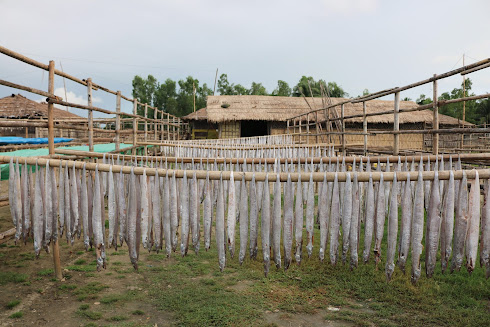Dried Fish Production in Cox's Bazar, Bangladesh
Cox's Bazar is a fishing town. The beach in Cox's Bazar is an unbroken 120 kilometers long, making it the world's longest beach. Cox's Bazar is also known as "Panowan" which literally means "yellow flower" and its older name was "Palongkee." The modern Cox's Bazar derives its name from Captain Hiram Cox, an officer of the British East India Company. Cox was appointed Superintendent of Palongkee and was mobilized to deal with the century-long conflict between Arakan refugees and local Rakhains. He embarked upon the task of rehabilitating refugees in the area and made significant progress. Captain Cox died in 1799 before he could finish his work. To commemorate his role in rehabilitation work, a market (bazar) was established and named after him.
Cox’s Bazar, being a coastal town, is the biggest source of dried fish in Bangladesh. The majority of the population in this area rely on the production of dried fish for their livelihood. However, there is the rampant use of hazardous pesticides in preserving seawater fishes. Thus, consumers are getting chemical-coated dried fish, which poses health risks.
AFA, the organization I am working with is working with COAST Trust and Bangladesh Fish Workers Alliance to motivate dried fish producers to stop the use of chemicals in their production. COAST Trust provides simple technology of organic dry fish production to small fisher folks and at the same time, they create demand for pesticide-free dry fish in the market.
With support from the AFA-LVC implemented program, our partners in Bangladesh conducted training on different eco-friendly methods of dried fish production such as using nets, turmeric water, fish dryer, etc. to groups of dried fish producers. So far, there have been 6 groups developed that are producing dry fish without the use of pesticides.
According to Fatima Begum, a dry fish producer, pesticide-free dry fish sells higher in the market. She also added that when they were producing fish with the use of pesticides, it attracts a lot of insects, but when they started using alternative techniques, insects no longer flock to the fish drying area.


